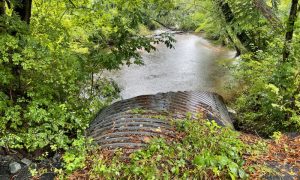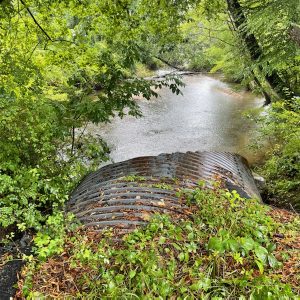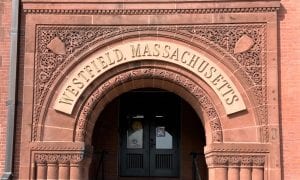WESTFIELD – The Board of Public Works is reviewing the proposed amendment of the stormwater ordinance that would replace the current bifurcated fee structure with a flat fee based on the area of impervious surface on the property.
The amendment was brought out onto the City Council floor Thursday, March 7, by the chairman of the Legislative & Ordinance Committee, Ward 1 Councilor Christopher Keefe, to begin discussion. Keefe asked that the council members send the amendment to the Board of Public Works for their review and feedback.
Tuesday night At-large Councilor John J. Beltrandi III, the liaison to the BPW, spoke of the amendment that would establish a flat fee of three-quarters of a cent per square foot of impervious surface, typically roofs and paved areas. That fee would generate the same income, about $660,000 for the City’s Stormwater Management Division within the Department of Public Works.
“The Council has not acted on this because it’s important for you to take a look at it,” Beltrandi said. “Revenue remains about the same, but the amendment has an abatement system where subdivisions and businesses, which are required by law to retain stormwater on their sites, can apply for a reduced stormwater management fee.”
Federal and state law requires projects, that disturb more than an acre of land, to install stormwater controls, usually retention systems, to ensure that the finished project does not discharge more water than was originally discharged by the undisturbed soils of the site.
“Residents of those newer subdivisions are being charged a fee by the homeowners’ associations for those stormwater management systems,” Beltrandi said. “It’s unfair that they have to pay the city’s stormwater fee at the same rate as everyone else when their subdivision (or commercial project) is not discharging any stormwater off site.”
Beltrandi said that City Engineer Mark Cressotti has argued that the fee should be a revenue source for stormwater management along city roads and that residents, even those with stormwater retention system, use those city streets and should pay for those drainage improvements.
“A million people (from outside the city) are using city streets everyday and are not paying a cent,” Beltrandi said.
“The intent of this fee was to use funds to take care of the stormwater (drainage) system,” Beltrandi said. “Those funds are suppose to be earmarked for that purpose, but unfortunately the fees are being used for salaries.”
The DPW dedicates about $250,000 of the fees collected to paying the salaries of stormwater management division employees. The decision to use the fees for salaries was made several years ago to avoid laying off DPW employees. The division’s annual construction budget is about $100,000.
“There has got to be a better way to distribute those funds to maintain these (drainage) systems, of getting work done on the ground,” Beltrandi said. “The (City) Council understands that the DPW is the most underfunded department in the city.”
“We’re looking from input from you guys, ways of putting these funds into projects,” Beltrandi said. “I know that you don’t have the money to do that, but I want to make you part of the process.”
Cressotti argued that the fee should not only cover the present operating cost of the stormwater division, but have surplus funds that can be put into a reserve account to pay for major drainage improvement projects such as the Western Avenue and East Mountain Road reconstruction work projects over the next several years.
“Just the drainage for Western Avenue is estimated at about million dollars. Just the drainage for East Mountain Road will be around a million,” Cressotti said. “That’s over a $100,000, per project, per year, for at least 10 years in bond payments. If we built up enough money we could do whole projects.”
“I like the flat rate structure because it’s more equitable, but it needs to generate sufficient revenue to enable the city to pay for projects,” Cressotti said. “We have a list of projects that we need to do.”







